Your New Year’s resolutions are all set.
You’ve been planning your list for days or maybe weeks, and you finally feel ready to take the New Year head-on.
But, what is the hardest part about getting started with your New Year’s resolution, and how do you make sure all your New Year’s resolutions stick around for the entire year?
If you’re not sure how to answer these questions, then keep reading.
- Mentally Prepare for Change
- Make Your New Year’s Resolutions Stick
- Be the Person You Always Wanted to Be.
- Questions You May Have
Mentally Prepare for Change

Before you begin working towards any goal in life, you have to be mentally prepared to tackle any and all new challenges you will inevitably face.
The mental preparation you’ll need to undergo is by far the most difficult but important part. Change doesn’t happen overnight, and it’s insanely easy to slip back into old habits instead of making the sacrifices that will push you forward.
If you’re not willing to give up your leisure time, your comfort habits, or your social life, then you might need to rethink setting goals. In order to be able to reach any goal you desire, you must sacrifice something else that is presently taking up space.
If you’re determined to either lose weight, read more books, become healthy, or improve yourself in any other way, you should be psychologically ready because, with each step forward, a lesson must be learned.
Those lessons come in the form of challenges, and without a focused and determined mindset, those new challenges can seem too much to handle.
It’s easy to stay on the same path and do the same things you’ve always done, but doing so will keep you on your current path with zero growth potential.
Before you start working on any New Year’s resolution or goal, you need to mentally prepare yourself for the challenges you’ll inevitably face.
5 Simple Steps to Prepare Your Mind for Change
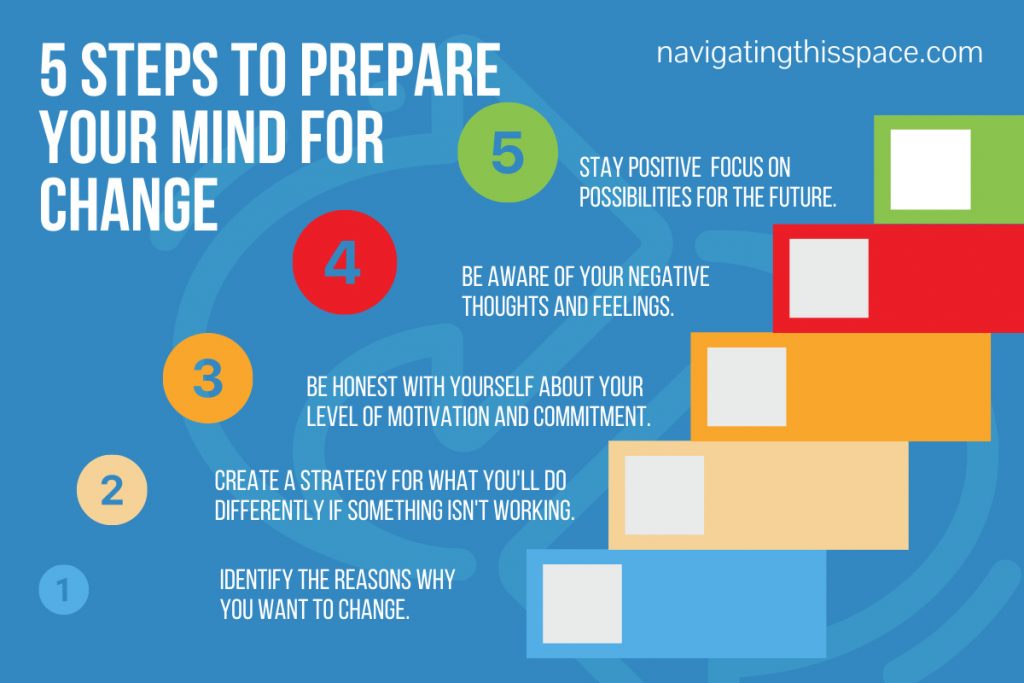
- Identify the reasons why you want to change.
- Create a strategy for what you’ll do differently if something isn’t working.
- Be honest with yourself about your level of motivation and commitment.
- Be aware of your negative thoughts and feelings.
- Stay positive — don’t dwell on negatives or things that have happened in the past. Focus on possibilities for the future.
Once you’ve prepared your mind for change, then it’s time to tackle those resolutions you’ve set.
Make Your New Year’s Resolutions Stick

It’s not enough to just want it — you have to work at it!
Things don’t magically happen overnight, so here are five simple steps you can follow that will help ensure a successful year:
1. Be Specific With Your Goals

If the outcome is too vague or undefined, it’s difficult for you to know how to proceed.
You need to create a clear picture of what you want in order to be successful.
For example, if your resolution is to get in shape, you need to create a clear picture of what that looks like for you.
Do you want a six-pack? Do you want more muscle? Is it important for you to be able to run faster or longer than before? How much weight do you want to lose?
The clearer and more detailed your goal, the better chances you’ll have of achieving it.
Try not to leave anything up for interpretation, as this can lead down a dangerous path where everything begins falling apart.
Also, refrain from being very rigid. Set your goals but keep an open mind. Your path may take many unexpected turns but don’t lose sight of what you want because, without a tangible goal to work toward, your New Year’s resolutions will fall apart without you knowing what happened.
Don’t be afraid of trying new things or taking new paths as long as they are leading you closer and closer to your ultimate destination.
Setting achievable goals will push your new resolutions forward instead of causing them to fizzle out after just one week.
Keep in mind that momentum and confidence are built over time, so don’t get discouraged if your journey starts off a lot slower than you anticipated.
Having specific and well-thought-out goals for your resolutions basically hands you the action plan to get started, so if your goals are too vague, go back and refine them.
Instead of writing “I want to read more books next year,” pick a number of books that you think you can read and aim to get there.
Don’t make the challenge too easy or too difficult. You’ll feel discouraged to start because you’ll either feel not challenged enough or think it’s too difficult to even try.
Any new year’s resolution will likely fail if you set yourself up for failure by not allowing enough room for growth or setbacks along the way.
2. Write Down the Benefits

There should be perks for sticking to your New Year’s resolutions. Otherwise, what’s the point in setting New Year’s resolutions?
Make sure you’re writing down all the new benefits that will come from achieving your new goals.
By doing this, you’ll be able to keep yourself motivated and excited during even your toughest days when progress seems impossible or too slow.
It might seem like a simple tip, but it’s an easy one to forget about.
If you don’t remind yourself why your New Year’s resolution is important to you, your motivation will eventually fade away, and then your goals that were once so easy and exciting for you to achieve become much harder or impossible altogether.
Write down all of the new benefits that come with completing your new goal and post them somewhere visible to constantly remind yourself why you’re working towards your goal.
A simple note on a piece of paper can be enough, but sometimes getting creative and making something fun like an actual poster or a vision board designed specifically around your new goals can push you even further along when times get tough, and you begin to question why you’re putting yourself through additional stress and challenges.
The point is, if there aren’t any perks involved with fulfilling these goals, then the chances of you fulfilling your New Year’s resolutions will be slim to none.
List your perks and keep a visual reminder of why you’re working hard at your goal every day.
3. Create an Action Plan
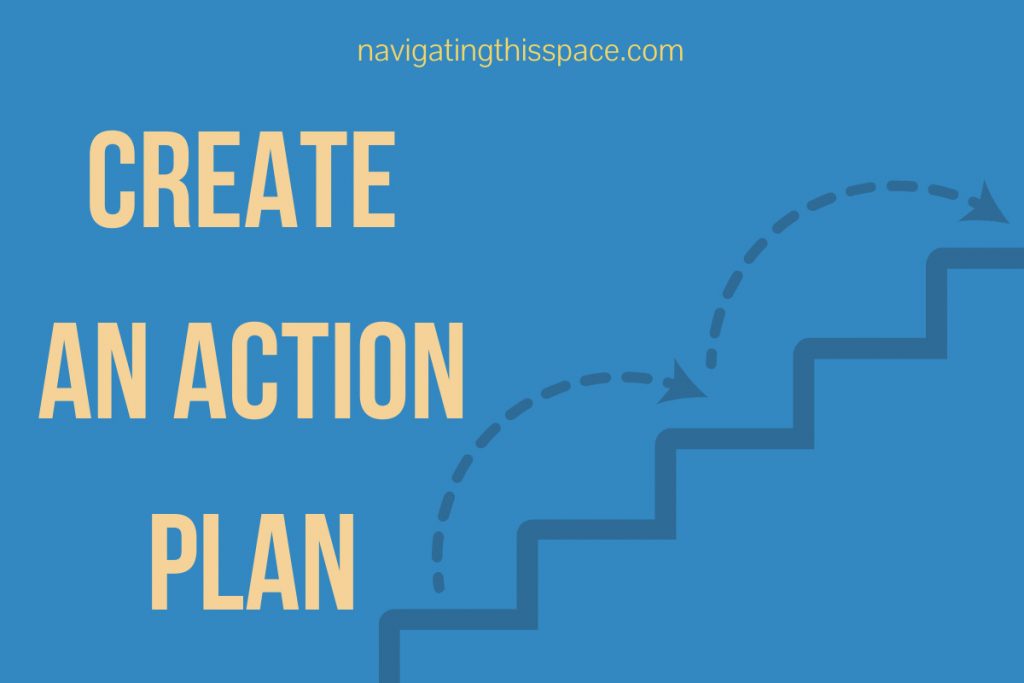
A goal without a plan is just a wish. But with the right planning, that goal can become a reality!
An action plan is simply a list of steps that will get you closer to achieving your New Year’s resolutions.
When you break down your goal into smaller parts, it becomes much more manageable. You’re creating milestones that will help keep the process going and give yourself something to work toward.
The milestones allow you to break your goal into bite-size doable steps that you can accomplish more quickly while allowing yourself to track your progress rather than waiting until the year is complete.
Creating milestones forces you to think about what it actually takes and how much work goes into completing this new resolution.
Milestones — also known as deadlines — are a great way of ensuring that your goals are met by a specific time or after you’ve accomplished specific tasks.
For example, if you wanted to improve your fitness, which according to Statista was the number one New Year’s resolution goal of 2021, your New Year’s resolution might be to “go to the gym 3-4 times per week.”
With that goal in mind, think about the days and times that work best for you.
- Will your workout sessions be early mornings or at the end of your day after your daily tasks are completed?
- What types of exercises will make up your workout plan?
- How will you keep challenging yourself, so you don’t get bored when things start to feel too repetitive?
As you can see, simply going to the gym three to four times each week comes with a lot of pre-planning to make sure you’re getting the most out of your new goal.
It may seem like a lot, but when your goal starts to manifest those benefits you wrote down, you’ll be thanking yourself for putting in the work beforehand.
In other words, identify all aspects involved before making any commitment to see your New Year’s resolution through.
Create an action plan to keep yourself accountable and on track toward achieving your new goal.
4. Track Your Progress
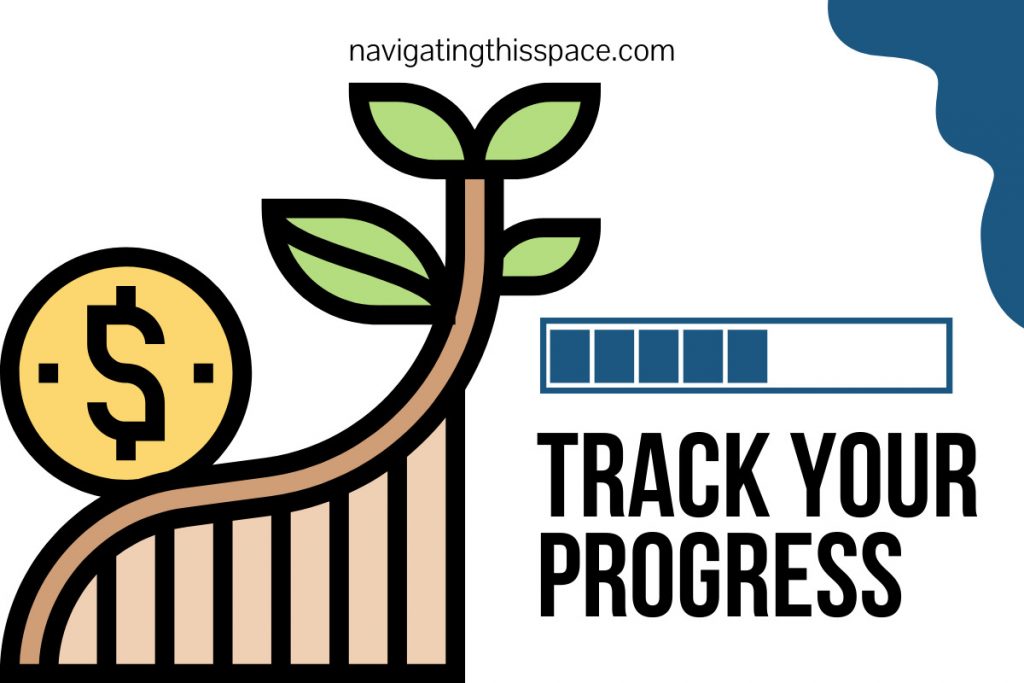
The only way to know if you’re making progress is by tracking your results.
It is human nature to want immediate satisfaction, but the only way you can know if your efforts are paying off is by tracking them.
If you’re unaware of what you’ve already accomplished, how will you know what your next step should be?
It’s easy to think that once you make a decision and stick with it, all of your problems will be solved. But the reality is often different.
As we’ve identified above, your goal has many parts, and each part takes effort and time to complete.
Without tracking your results, you won’t know if your resolution is on track to being accomplished or on track to being abandoned.
This is why you need to develop New Year’s resolutions with milestones in mind, break your new goal down into small pieces and keep track.
Identify the stages of your goals and when you should be putting in more work or taking it easy.
Keeping track of your goals won’t be much fun because it’s like taking inventory and who really likes doing such tedious work, but force yourself if you must because it is the only way to ensure success.
When it comes down to it, taking action and diligently tracking your progress are necessary steps toward achieving any goal.
5. Celebrate After Each Goal Is Achieved!
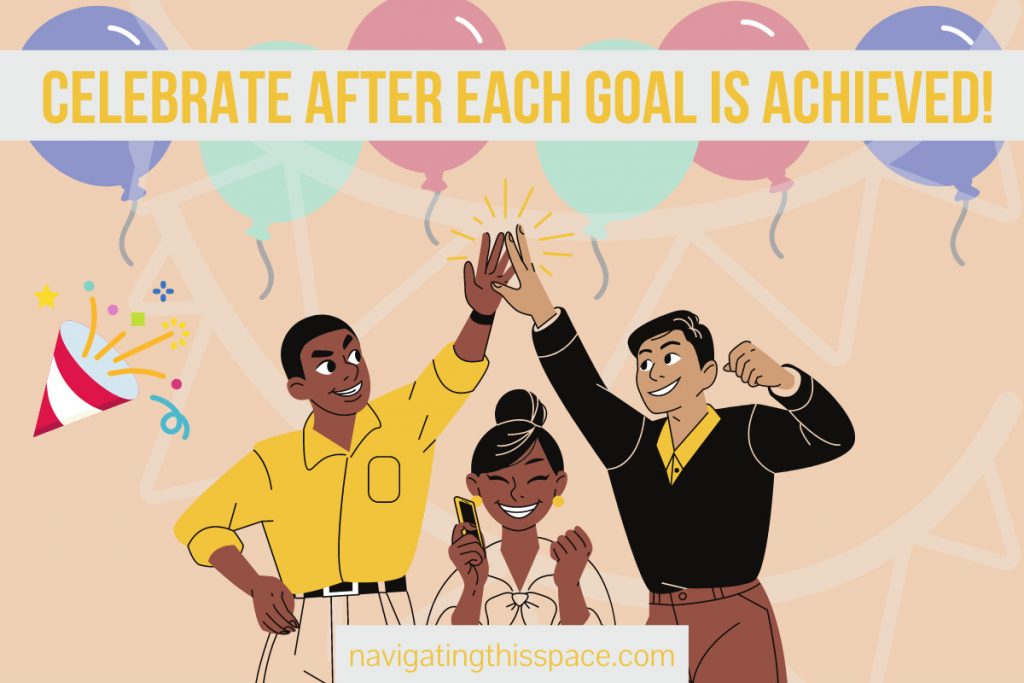
Achieving goals isn’t worth it when your only focus is conquering the next goal into achievement. Spend more time celebrating your milestones and small achievements that indicate growth.
Take the time to celebrate your goals with friends, family, or even alone when they come to fruition because it is not only important for staying committed but celebrating will also provide motivation moving forward.
Your resolution ideas came from a place that desired change, so when you’re finally able to see that change starting to manifest, take the time to really appreciate it.
It’s not about how big or grand your celebration is, but what matters most is knowing you deserve this moment because you put in the work and stuck by your decision when things got tough.
Celebrate how you see best. If that means crying tears of joy, then cry tears of joy. If it means putting on a solo dance party, then go right ahead and dance your heart out.
Your mental health strives when you have a great balance between work and fun. If you don’t know how to celebrate your accomplishments, learn new ways to enjoy your victories because that feeling of accomplishment is worth more than any money you could receive.
Create a healthy habit of celebrating yourself every time you achieve a milestone or a goal because this will provide happiness and motivate you to keep going.
Practice appreciating all the good in yourself and your life.
Be the Person You Always Wanted to Be.

You created New Year’s resolutions to achieve new goals because you’ve identified that something in your life needs to change, so don’t give up when you hit a dead-end, or things become difficult.
Keep in mind that it’s never too late to create the change you want to see in your life.
Now that you’re equipped with these simple steps to make your New Year’s resolutions stick, don’t keep them all to yourself!
Share this article with everyone you know so they can accomplish their new goals too.
Questions You May Have
What are common New Year’s resolutions?
The most common New Year’s resolutions are to quit smoking, lose weight, save money, be a better person/parent/partner/friend, sleep more, and get organized. The top five resolutions that Americans make every year are to eat healthier, get organized, lose weight, save money, and spend less time on the computer or phone.
What are some good resolutions?
New Year’s resolutions should involve topics you’re passionate about and things you want to improve in your life. Choose resolutions that challenge you and make you want to work harder. Learn a new skill, exercise more, eat healthier, spend more time with family and friends, travel more, and save money.
Pin It!
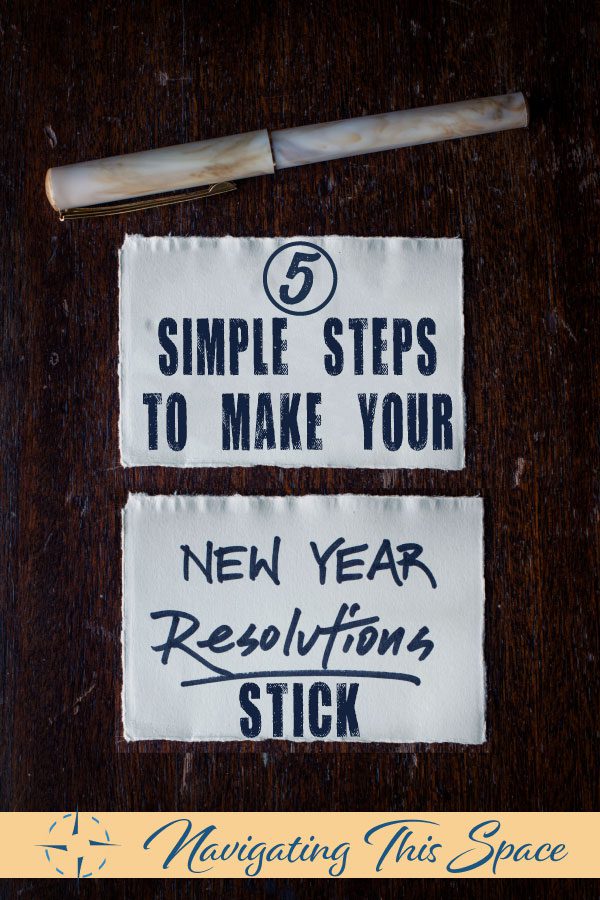
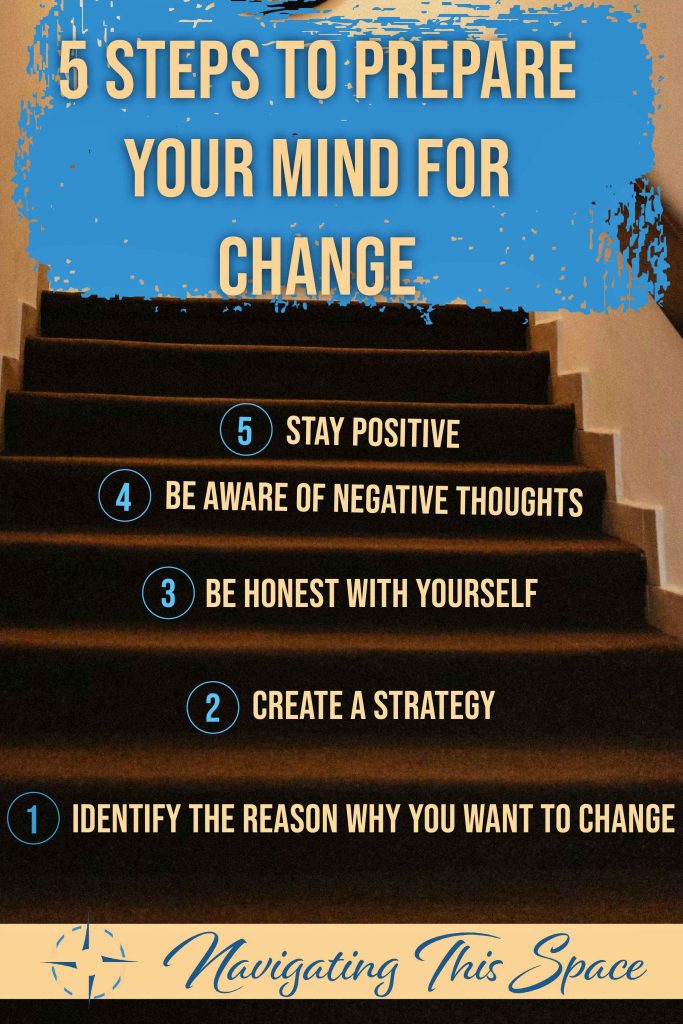




Thank you for the information! It can be so hard to stick to resolutions, as normally these aren’t habits we already have (or we wouldn’t be making them a New Year’s resolution!). I always can use good tips for establishing habits and sticking to them.
You’re very welcome TD
Write down the benefits, duh. How have I never thought of doing that before. I am going to do that this week because I love my goals this year but I am struggling to work towards them.
Keep those benefits visible in your daily life and it will push you harder to achieve those goals!
Having a clear goal and a reason why you want to achieve really drives results. In a moment I want to quit, it reminds me why I started in the first place, and that I should keep going. Thank you for sharing this great article 🙂
That’s right Mariya, a clear goal and you’re reasons are always a great motivator to achieving your goals. Thanks for reading.
Love this post and the insight you give on how to stick to your New Year resolutions! Starting with planning and knowing the benefits of your goals and ending with celebrating every goal was a great plan of attack. Writing it the way you did was a reminder that achieving goals don’t have to be all work and no play. I look forward to reading more articles!
If goals were all work and no play we wouldn’t try to pursue them Julie. I feel like if more people prioritized play in their goal journey they’d accomplish a lot more without overwhelming themselves.